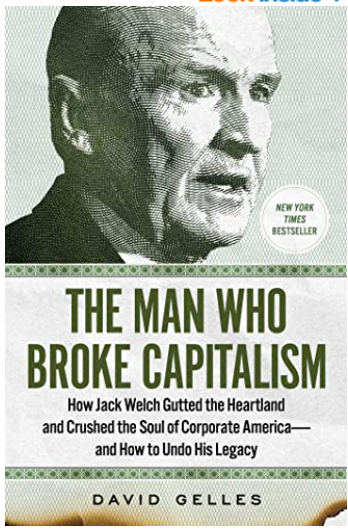The Man Who Broke Capitalism

Just finished reading this book written by New York Times reporter David Gelles. It reads like a hit piece on Jack Welch. For reasons that I’ll go into, I strongly believe Jack Welch earned a hit piece. But as little as I think of Jack Welch, I think a more surgical attack would have been more convincing to those who did not have a first hand seat to the world that Welch built. I thought the kind of accusations that Gelles makes in the book deserved to be sourced, but the book has no references of any kind. I wish I would have liked the book more. While Gelles has firsthand experience with Welch that formed his distaste for him, I don’t think he would argue that Welch hurt his career or industry. I, and many others could though1.
Gelles writes at length about how Welch acolytes spread through the industry. He even strikes at my own personal experience at AlliedSignal/Honeywell under one his most famous early proteges Larry Bossidy - my sweet spot. I interned at AlliedSignal in 1998 for six months, went to grad school, and came back to Honeywell in 2000 thru 2012 - all my early career into mid. The same thread-bare cubicle walls and carpet existed through my time there, but the number of buildings they filled progressively shrank. In 1998 the facility was rather large and full. Three large buildings of engineers Three buildings for manufacturing of high precision machined parts required for gas turbines. There was an assembly facility to put together the engines, and a well equipped test facility2 Over time, all of the manufacturing was moved mostly offshore or to Mexico. The three buildings of engineering reduced to only one. Layoffs to make the numbers were frequent over the holidays. People would be layed-off, with some but not all offered jobs back the following year. When people voiced dissatisfaction, leaders would usually give some type of smug, or patronizing look as if the person asking the question was questioning something as fundamental as gravity. The term gas-lighting didn’t exist yet, but that’s what it was. The end result was a steady deterioration in the capability of the company to design and build what it existed to do. I have not worked at Boeing, but from not too afar, it appears that what happened at Honeywell has played out on a much larger scale at Boeing at the hands of the other GE alumni.
-
Gelles has the internet tycoons to thank for the demise of his chosen profession. ↩
-
This post will give a negative impression of Honeywell, but before facilities were closed, it was a fantastic place to learn all that goes on in engineering. One place to design, manufacture and test highly engineering products in an non-union environment, are very rare. I was very lucky to learn from some great people too. ↩